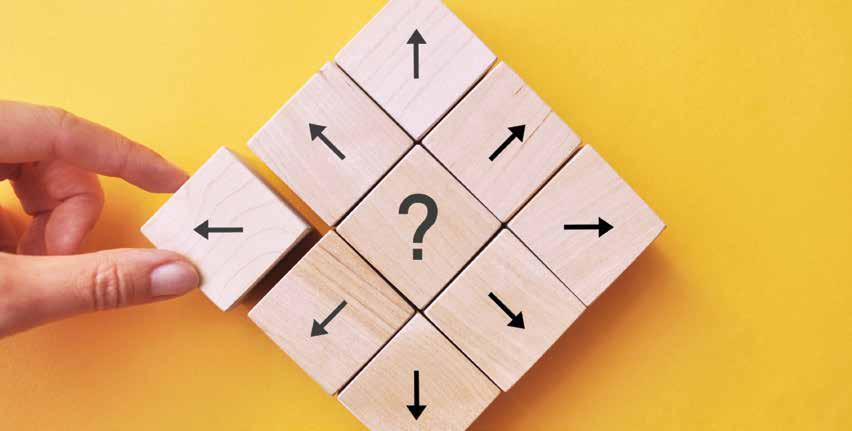
4 minute read
Feature Confessions of a (not so) novice pianist
CONFESSIONS OF A (NOT SO) NOVICE PIANIST
Zoë Briggs, Drama Teacher and EPQ Supervisor, on how resuming piano lessons after almost two decades has made her a more enterprising and empathetic teacher.
As teachers, we work amongst learners. In general, there’s a hierarchy: the superior, knowledgeable, authoritative teachers and the inferior, naïve learners. But how well do we remember the experience of being a learner? I have found that becoming a learner again has highlighted all sorts of pitfalls and challenges that our pupils face – it has made them real to me and helped me see the learning experience through their eyes. Even more valuably, it has reminded me of the distinction between novice and expert learners – what it feels like to be a wide-eyed, eager but unsophisticated student, compared to the sage and experienced approach of an expert.
Think about it: when was the last time you placed yourself in the formal position of the learner? Until recently, my last experience was really at university. Sure, I’d fiddled with the odd foreign language app, listened to some Italian podcasts, and attended many a professional training session and conference, but for a while I hadn’t faced the pressure of a teacher expecting me to make sustained progress in a particular skill or area of knowledge. Then, I made the new year’s resolution to play our piano and decided that I needed a teacher to help motivate and coach me. I signed up to fortnightly piano lessons with one of the Visiting Music Tutors in our STAHS Music Department. I am not a novice pianist (and nor am I truly a novice learner) but my zenith in piano playing was nearly 20 years ago. At my first lesson this year, I was very rusty and feeling a distinct lack of confidence. Despite being fairly used to performing, I was nervous about playing in front of a professional. A few months in, I have made a few observations about what it feels like to learn.
It’s lovely to practise what you know ... but it gets boring
Playing an easy piece to start with gave me great satisfaction as a learner. I was able to build my confidence and feel pride in making a beautiful sound. Mastery gave me joy and playing faster, louder, and with more of a bounce was thrilling, despite the low difficulty level. This reminded me why pupils like to repeat exercises or do a Kahoot quiz on a topic they already know well. But soon, I became bored with that piece; it didn’t present enough challenge and as a result it became robotic.
Straying outside of your comfort zone feels scary
In my lessons, I could feel my teacher pushing me beyond where I was comfortable into that golden zone of growth. I’m not going to lie: it felt scary. When I was stretched, my fingers wavered, I got giggly, and I stumbled over the notes – but afterwards, I could sense that I had really achieved something. After a few lessons, I was more familiar with the fear factor, and I started to relish it. I knew it meant progress.
Zoë performing recently.
Expert terminology flatters me
When my teacher uses musical terms, and we converse in the specialist language of music, I feel flattered – it makes me into a musician. This reminds me that we must be ambitious in the way we speak to pupils; if we treat them as mini-experts, they will develop their own vocabulary and learn to speak specifically about our subject.
High support, high challenge
In my lessons, my teacher gives me a high level of support: she creates scaffolds for me to try new techniques, she models tricky passages, and she gives plenty of verbal encouragement. This gives me the confidence to make mistakes, so the high level of challenge feels appropriate. I’ve noticed that we can only truly challenge pupils when they feel supported to stretch their skills – so progress is possible.
Cramming is natural
As a teacher, of course I know that interleaving my practise will result in progress and improvement. Does this mean I practise every other day? Absolutely not. Like any normal human, I realise three days before my lesson that I haven’t practised nearly enough and I cram in time on the piano to try to compensate, then arrive at my lesson apologising to my teacher before I even touch the keys. It’s amazing how many times I take this impractical approach. Changing a habit is so difficult, and I realise now how tricky our pupils must find it too.

Young Zoë at the piano.
Success in something more difficult is more satisfying
Having enjoyed showing off my mastery of the earlier, simpler pieces, I have found that succeeding at a more difficult piece, and knowing it is difficult, is far more satisfying. A tricky Chopin nocturne is keeping me awake at night, but when I crack it I know that I’ll be secretly celebrating. This week I even took a deep breath and played that Chopin – haltingly – on the grand piano in the Jubilee Hall. No one heard me, but I felt such elation and pride in myself.
I continue to enjoy my piano lessons, and the initial raw feeling of discomfort of being in the learner’s seat (or piano stool) has eased. Becoming a conscious learner again has helped me to observe the attention, concentration, and commitment required to construct knowledge and re-build skill. I’ve become more alert to the fascinating, complex process of learning, and consequently more enterprising and empathetic in the classroom.

References:
Dweck, C. S., 2008. Mindset: the new psychology of success. Ballantine Books. Allison, S. and Tharby, A., 2015. Making Every Lesson Count. Crown House Publishing.










